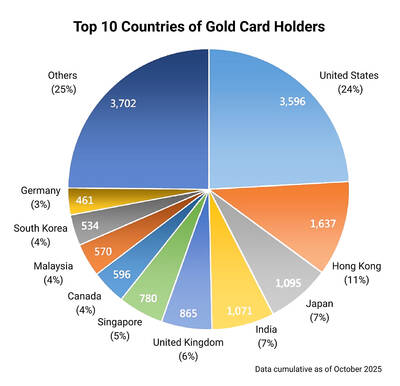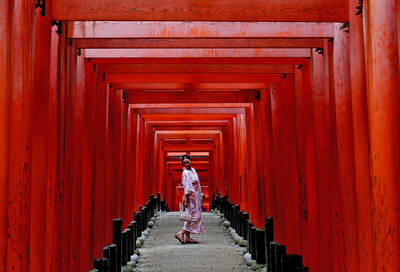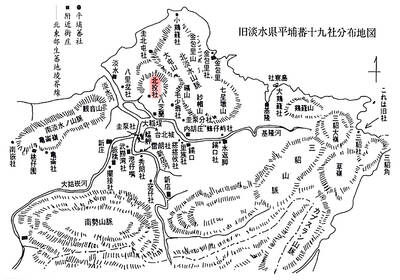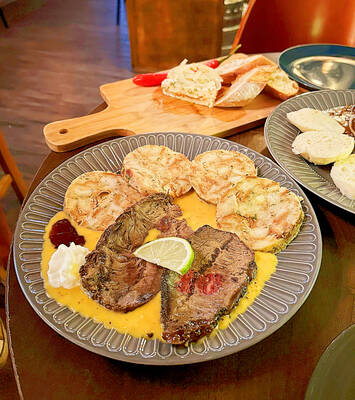The farming town of Meinung (美濃) in Kaohsiung County celebrates its unique Hakka culture this weekend with a bicycle tour and butterfly worship ceremony.
The 14th Yellow Butterfly Festival (美濃黃蝶祭) was originally started in 1995 to draw attention to environmental conservation efforts in the neighboring Yellow Butterfly Valley (黃蝶 翠谷), once home to millions of butterflies.
Those numbers fell drastically because of deforestation tied to a proposed dam construction project in the 1990s. By the time grassroots activists successfully halted the plan, the initial groundwork had already had an impact.
Now, during peak butterfly season in May and June, only hundreds of the insects can be observed, said Hsu Kuo-ming (徐國明) of the Meinung People’s Association (美濃愛鄉協進會), one of the festival’s organizers.
As usual, the festival features a bicycle ride in the Butterfly Valley area and a Butterfly Worship Ceremony, a traditional Hakka prayer ritual. But the event is no longer held during the peak season so as “not to disturb” the local ecology. Instead, the ceremony, which will be held tomorrow morning, now serves as a way of “apologizing to the butterflies,” said Hsu.
After the ceremony there will be booths set up by local groups to promote environmental awareness, as well as activities for children and a nature photography exhibition.
While the event still serves as a reminder of the importance of environmental conservation, it now focuses on cultural and community enrichment activities for Meinung residents and visitors.
This year organizers are placing the spotlight on Meinung’s Guanglin Community (廣林社區), which neighbors Butterfly Valley. The Guanglin Community Activity Center will provide bicycles free of charge for visitors to tour the area.
Bicyclists will be given tourist maps of Guanglin created by a group of students from Meinung as part of a community project.
Landmarks include several 100-year-old temples, kaiji bogung (開基伯公), or roadside altars built by earlier generations of Hakka settlers, and restored huofang (夥房), traditional Hakka houses similar to the U-shaped sanheyuan (三合院). The tourist maps also include popular local eateries serving traditional foods such as bantiao noodles (粄條).
The Butterfly Worship Ceremony takes place tomorrow at 9:30am at the Shuangsi Tropical Viviparous Forest (雙溪熱帶母樹林) near Guanglin Community and Butterfly Valley, which is a 20- to 30-minute drive from the town center.
The best way of getting there is by car or motorcycle. From Meinung, organizers say to follow the yellow flags planted along the town’s main road.
The event runs all day tomorrow and Sunday and is free. For a full schedule (in Chinese only) visit www.wretch.cc/blog/heausangfee.

Seven hundred job applications. One interview. Marco Mascaro arrived in Taiwan last year with a PhD in engineering physics and years of experience at a European research center. He thought his Gold Card would guarantee him a foothold in Taiwan’s job market. “It’s marketed as if Taiwan really needs you,” the 33-year-old Italian says. “The reality is that companies here don’t really need us.” The Employment Gold Card was designed to fix Taiwan’s labor shortage by offering foreign professionals a combined resident visa and open work permit valid for three years. But for many, like Mascaro, the welcome mat ends at the door. A

The Western media once again enthusiastically forwarded Beijing’s talking points on Japanese Prime Minister Sanae Takaichi’s comment two weeks ago that an attack by the People’s Republic of China (PRC) on Taiwan was an existential threat to Japan and would trigger Japanese military intervention in defense of Taiwan. The predictable reach for clickbait meant that a string of teachable moments was lost, “like tears in the rain.” Again. The Economist led the way, assigning the blame to the victim. “Takaichi Sanae was bound to rile China sooner rather than later,” the magazine asserted. It then explained: “Japan’s new prime minister is

NOV. 24 to NOV. 30 It wasn’t famine, disaster or war that drove the people of Soansai to flee their homeland, but a blanket-stealing demon. At least that’s how Poan Yu-pie (潘有秘), a resident of the Indigenous settlement of Kipatauw in what is today Taipei’s Beitou District (北投), told it to Japanese anthropologist Kanori Ino in 1897. Unable to sleep out of fear, the villagers built a raft large enough to fit everyone and set sail. They drifted for days before arriving at what is now Shenao Port (深奧) on Taiwan’s north coast,

Divadlo feels like your warm neighborhood slice of home — even if you’ve only ever spent a few days in Prague, like myself. A projector is screening retro animations by Czech director Karel Zeman, the shelves are lined with books and vinyl, and the owner will sit with you to share stories over a glass of pear brandy. The food is also fantastic, not just a new cultural experience but filled with nostalgia, recipes from home and laden with soul-warming carbs, perfect as the weather turns chilly. A Prague native, Kaio Picha has been in Taipei for 13 years and